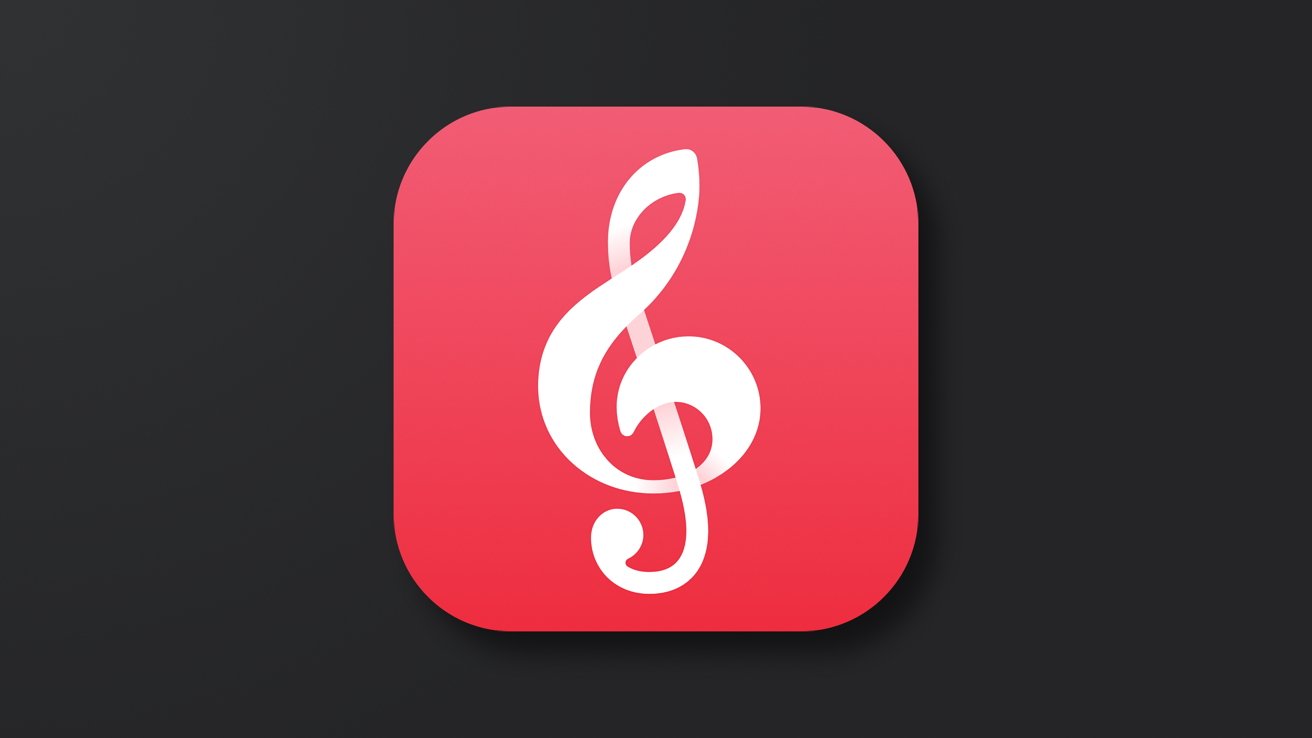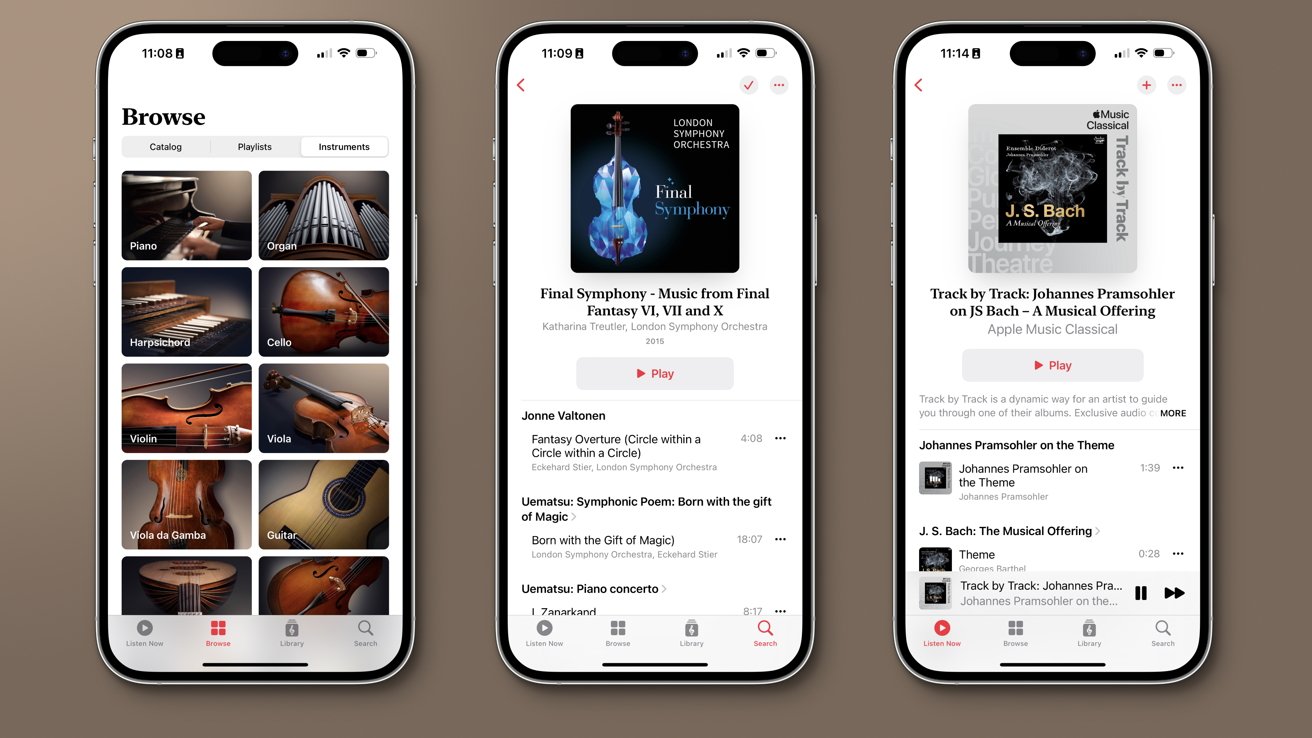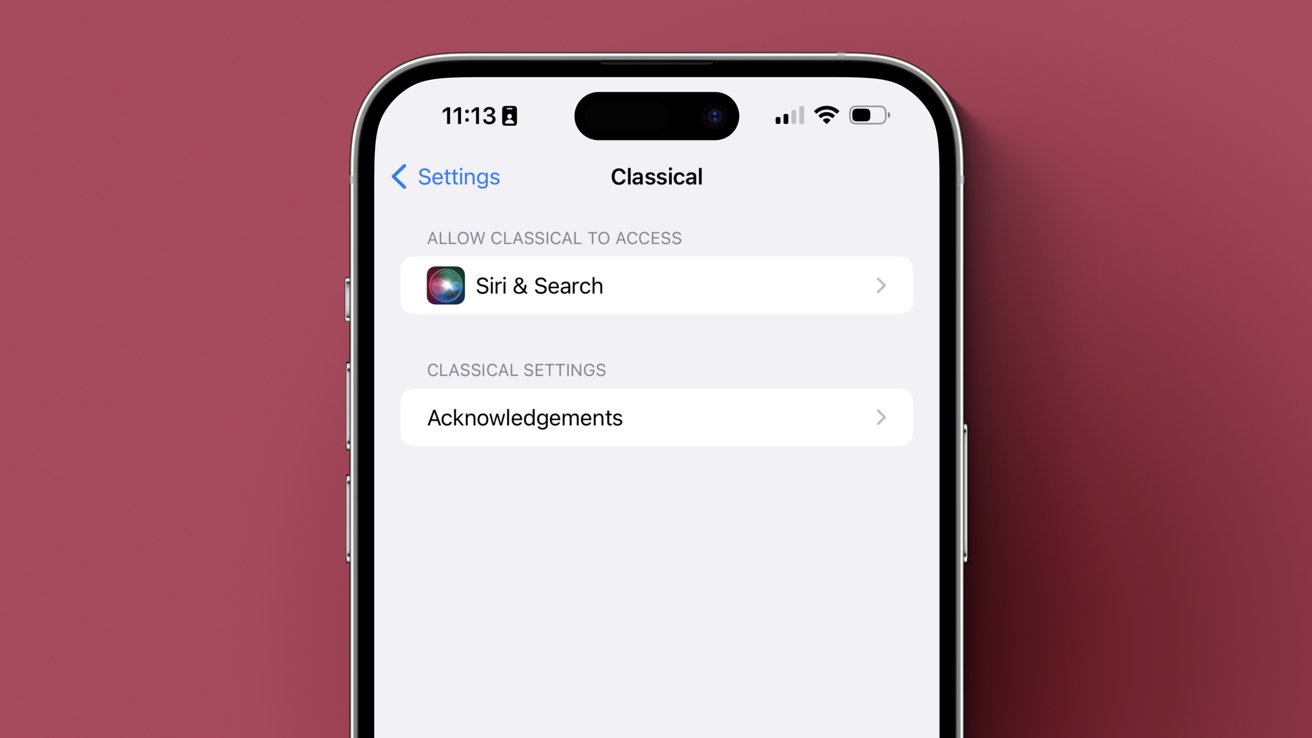Apple Music Classical waltzes onto iPhone
Apple Music Classical provides curated access to a range of classical and classical-inspired music, and it can now be downloaded from the App Store globally.

Apple purchased Primephonic in 2021 with the intention of releasing a purpose-made classical music app. Now, over 18 months later, Apple Music Classical has finally launched globally.
The rollout began slowly on March 27 for international users. Some select users may not be able to download the app as of this publication, but it should be fully available by March 28.
The app provides a simple interface resembling Apple Music without a Radio tab. Users can jump right in to listen to music from the Listen Now tab, or search for music to add to their Library.
The Browse section is very different from Apple Music, which is usually inundated with the latest pop or rap music. Instead, users can see a selection of categories for perusing the classical catalog.
Speaking of the catalog, this isn't just a home for 17th-century classics or modern big bands. It's home to movie soundtracks, video game music, classical-inspired selections, and more.

Classical has a variety of modern and classic selections
Apple promises over 5 million tracks with high-quality audio up to Hi-Res Lossless and Dolby Atmos. Users can also benefit from the incredible volumes of metadata that include composer biographies, descriptions of key works, and more.
The app also has exclusive content like album walkthroughs from composers and experts called "Track to Track." Users can also listen along to "The Story of Classical" to learn more about classical music via commentary between tracks.
We were disappointed to discover that Apple Music Classical doesn't have any settings at launch. Any music played within the Classical app that is also cataloged in the Apple Music app will show up in the user's "Recently Played" section and affect their recommendation algorithm.

Apple Music Classical doesn't have any settings
There are no AirPlay 2 controls from within the app, meaning the HomePod can't take over playback from an iPhone. The iPhone must send audio to a HomePod or Mac using the regular AirPlay protocol.
The app is localized in English, Dutch, French, German, Italian, Portuguese, and Spanish. It will work on any iPhone or iPod that can run iOS 15.4 or later.
Apple lists Apple Music Classical as available worldwide where Apple Music is offered, excluding China, Japan, Korea, Russia, Taiwan, and Turkey. The app can be downloaded from the App Store.
Read on AppleInsider
Apple purchased Primephonic in 2021 with the intention of releasing a purpose-made classical music app. Now, over 18 months later, Apple Music Classical has finally launched globally.
The rollout began slowly on March 27 for international users. Some select users may not be able to download the app as of this publication, but it should be fully available by March 28.
The app provides a simple interface resembling Apple Music without a Radio tab. Users can jump right in to listen to music from the Listen Now tab, or search for music to add to their Library.
The Browse section is very different from Apple Music, which is usually inundated with the latest pop or rap music. Instead, users can see a selection of categories for perusing the classical catalog.
Speaking of the catalog, this isn't just a home for 17th-century classics or modern big bands. It's home to movie soundtracks, video game music, classical-inspired selections, and more.

Classical has a variety of modern and classic selections
Apple promises over 5 million tracks with high-quality audio up to Hi-Res Lossless and Dolby Atmos. Users can also benefit from the incredible volumes of metadata that include composer biographies, descriptions of key works, and more.
The app also has exclusive content like album walkthroughs from composers and experts called "Track to Track." Users can also listen along to "The Story of Classical" to learn more about classical music via commentary between tracks.
We were disappointed to discover that Apple Music Classical doesn't have any settings at launch. Any music played within the Classical app that is also cataloged in the Apple Music app will show up in the user's "Recently Played" section and affect their recommendation algorithm.

Apple Music Classical doesn't have any settings
There are no AirPlay 2 controls from within the app, meaning the HomePod can't take over playback from an iPhone. The iPhone must send audio to a HomePod or Mac using the regular AirPlay protocol.
The app is localized in English, Dutch, French, German, Italian, Portuguese, and Spanish. It will work on any iPhone or iPod that can run iOS 15.4 or later.
Apple lists Apple Music Classical as available worldwide where Apple Music is offered, excluding China, Japan, Korea, Russia, Taiwan, and Turkey. The app can be downloaded from the App Store.
Read on AppleInsider

Comments
1) This app retains the utterly ignorant-of-classical-music method of assembling playlists that was so infuriating with Apple Music. One is presented with the third movement of this followed by the first movement of that, and so on. The people at Apple Music simply view each part of any complex classical composition as a separate, independent "song". It's like reading chapter 3 of one book followed by chapter 12 of another book etc. This ignores the fact that all the movements of a classical composition are actually a whole narrative that loses meaning and context when broken, separated and thrown together randomly.
Clearly, Apple has not hired anyone who actually understands classical music but just people who view it in the paradigm of pop or jazz albums that are indeed collections of "songs" that can generally stand alone as independent pieces.
2) On the positive side, if one avoids the ignorant playlists, it is quite a bit easier to find music by an actual composer or by the name of a composition. A search on "Gotterdammerung" for example yields the actual Wagner opera and not a page of miscellaneous pop recordings that have little or nothin to do with Wagner, or opera.
Don't get me wrong: I listen to and love a wide variety of pop, rock, jazz, World, etc. music. I am just dismayed that Apple, one of the richest and most innovative companies in the history of the World, can't find even one person who understands the important differences amongst various genres of music.
It seems OK, not great. I did some searching for a few things and the variety of recordings, meaning different recordings of the same work, is very limited. That’s probably because they’re still signing up different record labels. I HOPE that’s it.
They seem to want to continue certain musical prejudices, like a Baroque introduction section with Bach, Händel and Vivaldi ONLY, like it’s 1970 or something.
A symphony isn’t 4 or 5 “songs”, a concerto isn’t 3 “songs”.
Apple Music Classical seems to provide information about who is the composer and which composition is being exerpted even in playlists.
Also, I was able to Airplay from my iPhone to an Apple TV 3rd generation which I use as the source for my audio system because it has an optical audio output that I feed into a DA converter which inputs to my preamplifier.
WHY not Car Play or Home Pod integration
How many years did they have to develop this App.
I am streaming to my HomePod mini - but first time I tried it continue to play from Music
It does play thought the car sound system when the iPhone is connected via Car Play - but it would be nicer if the app had a Car Play interface
Also, what happened to autoplay? I expected to select a symphony or concerto, listen to it, and then hear random suggestions of full (all movement) works. Why is this not an option?
What have they been doing for the last 2 years?
Works great on the iPhone and very well within CarPlay. And allows you to play the music of your choice music without any distractions.